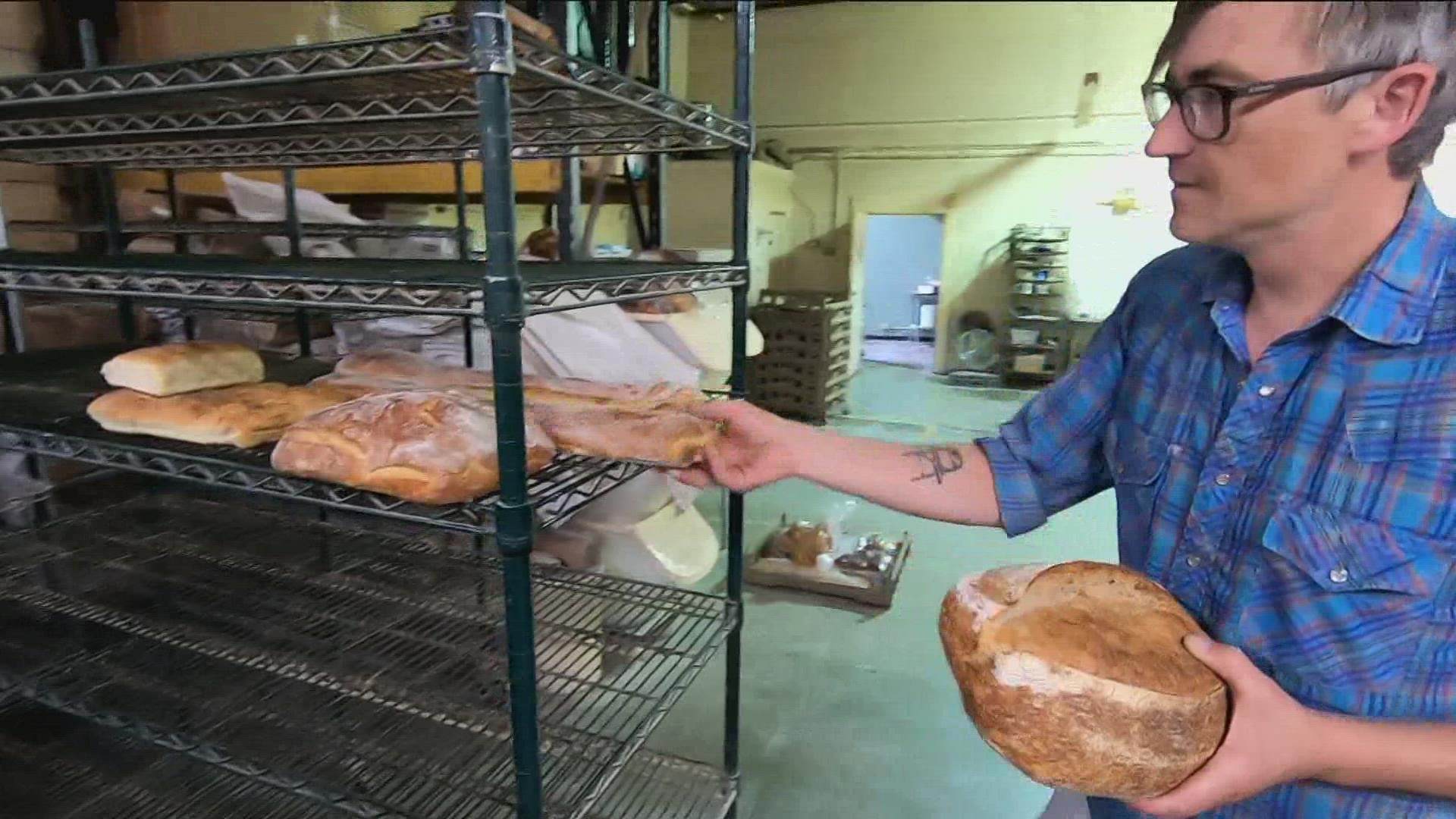GARDEN CITY, Idaho — Tucked away in an old industrial building sits Acme Bakeshop and its 15 employees, who work through the hours many spend sleeping.
"Our schedule is based on a restaurant’s lunch time," Acme Founder Michael Runsvold said. "If they don't have bread before lunch, they get stressed."
There's no logo to draw attention. There are no advertisements on billboards. Just a red notecard-sized sticker on the front door.
"Acme," it reads.
Inside that door is a world Runsvold built for himself starting back in 2012.
"I don't know if I could describe it to you," Runsvold said. "You start with a bag of flour and a bucket of water and you end the day with a stack of beautiful bread. You're transforming stuff. It's incredible."
To pay the bills, Runsvold sells bread to more than 50 local restaurants and businesses. Acme sells bread at Farmers Markets just to have fun, according to Runsvold.
However, the cost of the fun now comes at a higher price. Runsvold increased the cost of his bread to keep up with the rising cost of ingredients.
"It's just a matter of inputs. Everything we use to make bread costs more - down to employees," Runsvold said. "Everything has gone through a phase of being harder to find. It's just more work to do this work."
Acme's prices are increasing between 50 cents to $1 more per product, Runsvold said. It's a decision he didn't want to make, but it's a decision he had to make to stay in business.
Runsvold buys his flour from a co-op located on the Palouse. The business is called Shepherd's Grain.
Flour costs $17 per bag, according to Runsvold. This isn't the cheapest price Runsvold can find, but it's the most stable price.
That's because the co-op buys directly from farmers and sells directly to the customer. The whole point is to avoid the commodity market where prices are set on a macro-level.
“Wheat growers are price takers, not price makers. They do not set their price of sale. It's what they're offered," Idaho Wheat Commission Executive Director, Casey Chumrau said.
The global economy - and world events - significantly impact the cost of wheat on the commodity market, including the war in Ukraine. Russia and Ukraine export 30% of the world's wheat, according to Chumrau.
This is creating severe uncertainty in the market. However, prices have been unstable for years.
"In the last 10 to 20 years, we've seen a lot more volatility in the grain markets," Chumrau said. "If you talk to people whose grandparents grew wheat, it was a lot if it changed 20 cents in one year. Now, we can change 20 to 40 cents in a day."
Most farmers gamble on whether the commodity market price will cover the cost of production with money left over for a profit. It's an increasingly dangerous bet as diesel fuel, fertilizer and other overhead costs increase.
"Anywhere from 60-300% increases depending on the input," Chumrau said "The cost of production for producers has increased significant this year."
The local co-op Acme buys from, Shepherd's Grain, avoids all of this. The co-op sets their prices based on the cost of production. This ensures the farmers make a profit and the customer has a stable, dependable price.
"I don't think anybody has had an easy ride. Everyone is trying to find their feet," Runsvold said.
As the cost of production continuously climbs, so do the co-op prices. It's a cost Runsvold has to pass on to his customers.
While Runsvold loves what he does for a living, he's navigating unfamiliar territory amid a time of rapid inflation.
"Everything has been changing so much recently. It's hard to know if you're making the right choice for what's possible in the future," Runsvold said.
The United States Bureau of Labor Statistics (BLS) tracks inflation through a variety of numbers and figures. The consumer price index (CPI) has increased by 8.6% over the past 12 months.
This is the largest CPI increase over a 12-month period since the end of 1981, according to the BLS.
Join 'The 208' conversation:
- Text us at (208) 321-5614
- E-mail us at the208@ktvb.com
- Join our The 208 Facebook group: https://www.facebook.com/groups/the208KTVB/
- Follow us on Twitter: @the208KTVB or tweet #the208 and #SoIdaho
- Follow us on Instagram: @the208KTVB
- Bookmark our landing page: /the-208
- Still reading this list? We're on YouTube, too:

